
The boiler is a critical part of any home. It keeps residents warm and provides them with hot water.
If social housing residents understand common issues - like what to do when the light on their boiler is flashing - then they will know if it’s something they can solve themselves or if they need a heating engineer.
This would mean less time without heating and hot water. It would also mean fewer callouts for social landlords, saving them time and money.
This guide is for social housing associations to share with residents to help them understand and deal with boiler problems.
It covers:
✔️ What a landlord’s responsibilities are regarding boilers
✔️ Common boiler issues
✔️ Tips for residents if they have a boiler problem
✔️ How residents can keep their boiler in good condition
Following this guide will mean fewer breakdowns, which helps tenants stay warm. It also means fewer repair call-outs and boiler replacements being required.
💡 Flashing light on boiler: What should I do? |
|
A flashing light means the boiler is not working correctly due to a fault. You may be able to fix it by resetting or repressurising the boiler - we’ll explain how to do this later. However, if these simple actions don’t work you must ask your landlord to send a heating engineer to fix it. |
Why Is Looking After Your Boiler Important?
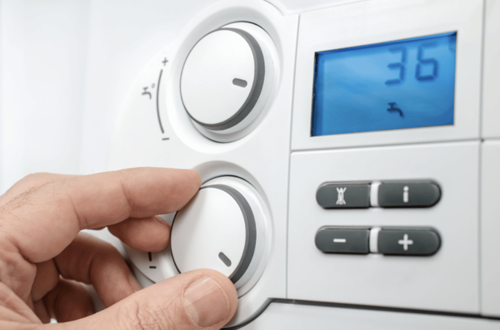
Looking after your boiler is important. If you don’t, it could develop a fault and break down. This will leave you without heating and hot water.
At best this is inconvenient, at worst it can damage your health. According to the Centre for Sustainable Energy, people are at greater risk of developing an illness if the temperature of their home drops below 15 degrees Celsius.
The good news is that boilers are generally reliable. They should last a long time if they are looked after and receive regular maintenance.
In the UK, many people switch on their heating for the first time in months during the autumn, only to discover a problem has developed.
There is often a spike in heating engineer call-outs around this time, and waiting times can be very long.
This leaves residents cold and frustrated.
It’s far better for residents to avoid these problems by learning to look after their boiler and deal with minor issues themselves.
⚠️ Warning: If in doubt, talk to an engineer |
|
Boilers can be dangerous. Although it’s generally safe to make minor adjustments yourself, don’t try to take your boiler apart or repair it yourself. In these situations, always report the issue. Make sure that whoever is sent to fix the problem is Gas Safe-registered. |
Know Your Boiler
Today, most people have a combination boiler - often shortened to “combi-boiler”. These are compact, modern boilers. They produce instant heat and hot water without the need for a storage tank. They are also energy efficient.
They are the most common type of boiler in the UK. That’s why this guide is aimed at people with combi-boilers.
What to Expect from Your Landlord
Your landlord is ultimately responsible for ensuring that your boiler works properly. Therefore, you should report any problems to them immediately.
According to the Gas Safety (Installation and Use) Regulations 1998 (GSIUR), your landlord is required to pay a Gas Safe-registered engineer to inspect and service all gas appliances in your home at least once per year. This includes the boiler.
The engineer will check that the boiler is working correctly and is safe. They will also recommend and carry out any repairs.
Once the inspection has been carried out, your landlord will be sent a Gas Safety Certificate. They must provide you with a copy of the certificate within 28 days of receiving it.
If your landlord does not carry out repairs or inspections as required then you should write to them and remind them that it is their responsibility. If they still don’t take action then you can write to the Health and Safety Executive or your council’s environmental health team.
Boiler Maintenance Tips
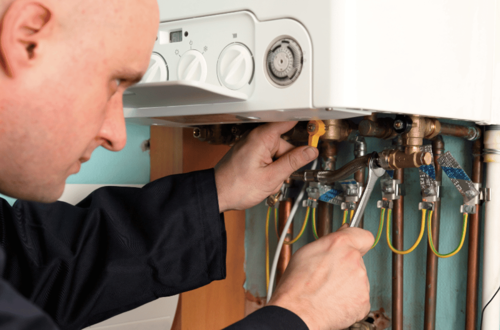
Here are some basic tips for checking your boiler and ensuring it stays in good condition.
-
Check if your radiators need bleeding: If your radiator is cold at the top but hot at the bottom, it may need bleeding. Find out how to bleed a radiator.
-
Flush out radiators: If you notice that your radiators are hot at the top but not at the bottom, it could be a sign that they have debris building up inside them. This waste material builds up in heating systems with missing or faulty filters. You may have to get your radiators flushed out. A heating engineer can do this for you.
-
Check the boiler pressure: Low boiler pressure is a common heating problem. Find out how to adjust your boiler pressure.
-
Check the flue is clear and unobstructed: This pipe can be found outside your property. It usually sticks out of the wall on the other side of your boiler - although it could be routed elsewhere. Your boiler won’t work properly if this is damaged, blocked, or obstructed.
-
Check the condensate pipe hasn’t frozen: The condensate pipe is also usually outside, on the other side of the wall the boiler is attached to. Sometimes these pipes get frozen in the winter, which stops the boiler from working. Avoid this by asking your landlord to insulate it with lagging.
-
Keep your boiler clean and clear: Boilers must be kept clean, dry and dust-free. Ensure the outside of yours is kept clean and make sure the room is relatively warm, without too much condensation.
Basic Boiler Maintenance
There are a few basic fixes that everyone should know for their boiler. These are:
-
How to bleed the radiators
-
How to increase the pressure
-
How to reset the boiler
Below, we explain how to do each in detail.
How to bleed a radiator
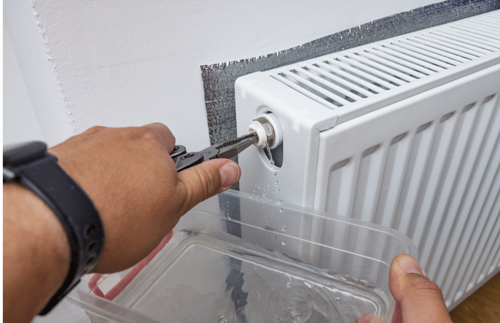
✅ Step 1: Turn on your heating to get the system producing heat to determine if your radiator needs bleeding
-
Check your radiator to see if there is an even temperature across it.
-
If your radiator has cold spots or makes a strange noise, you likely have air trapped in your heating system.
💡 If the cold spot is at the top of the radiator, it should be able to be fixed by bleeding.
✅ Step 2: Turn your heating off to begin the bleeding process
It’s important to turn it off so that you don’t get burned by hot water when you bleed the system.
✅ Step 3: Find your bleed valve and place a cloth or rag underneath it
Most bleed valves look like a round hole with a square inside and are fitted on the top corner of a radiator.
✅ Step 4: Open the bleed valve
Using a radiator key, open the bleed valve by turning anti-clockwise.
There should be a hissing sound as air escapes.
❗If you don’t have a radiator key, get in touch with us at EVO, and we’ll send you one for free.
✅ Step 5: Close the bleed valve
Once the hissing sound stops and water begins to leak out, turn the radiator key clockwise to close the valve.
✅ Step 6: Check the boiler pressure
-
Bleeding radiators will reduce the boiler pressure.
-
If the pressure is normal (1-2 bars), you can switch your heating back on.
-
If the pressure is too low (below 1 bar), you’ll need to repressurise the system.
How to increase your boiler pressure

✅ Step 1: Check your boiler’s water pressure
This will be shown either on a digital display or on a gauge. For most boilers this pressure gauge should be set between 1–1.5 bar.
✅ Step 2: Find the filling loop
This is a tap that is usually located under the boiler. There might be two of them. It’s normally connected to a flexible metallic silver pipe. You may have to open the bottom of your boiler’s casing to access it.
✅ Step 3: Fill your system
Open the tap/s. You should hear a filling sound coming from the boiler and the pressure should begin to increase.
✅ Step 4: Turn off filling tap
Close the tap/s once the pressure has reached between 1 and 1.5 bar.
✅ Step 5: Avoid over-pressurising
Over-pressurising your system can be dangerous. If you think you’ve done this then you can reduce the pressure by:
-
Bleeding a radiator: As explained above.
-
Emptying water from the boiler’s filter: The filter removes impurities from your radiator system and stops it from getting clogged. This is usually located below the boiler. It is often made of plastic and has a round top.
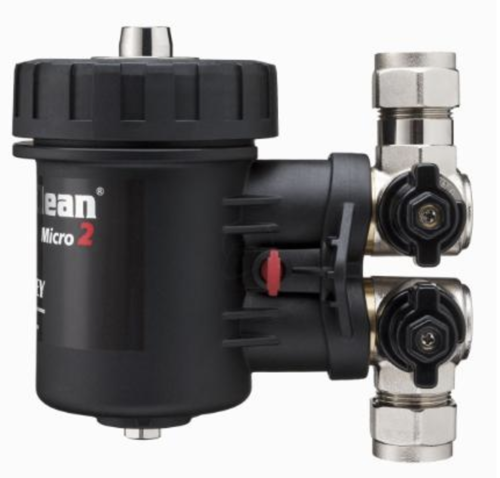
Image courtesy of mrcentralheating.co.uk
-
Opening a drain-off valve: Some properties have drain-off valves, as shown below. Like bleeding a radiator, this will release water from your system. Don’t forget to have a bowl and cloth ready to collect and clean up excess water.
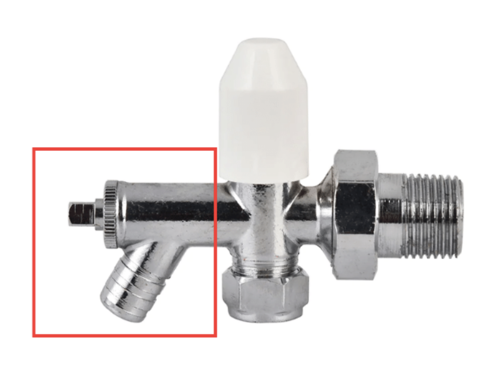
Image courtesy of hpwholesale.co.uk
✅ Step 6: Reset your boiler
If you repressurise your system because of an error code, you may have to reset your boiler. We explain how to do this below.
How to reset a boiler
Resetting your boiler is usually straightforward and can fix several common problems.
Most boilers either have a reset button or a knob. Simply push the button or turn the knob for a few seconds and your boiler should restart.
Some boilers might need to be switched off and on again using the power button.
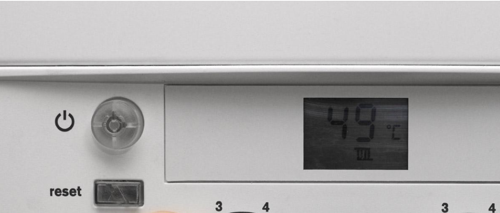
Image courtesy of Boilerguide.co.uk
Common Signs of a Problem
Here are some common signs that there is a problem with your boiler.
Error codes
Most boilers have some sort of digital display. If there is a problem, they may show an error code.
Sometimes these problems can be fixed yourself, while others require an engineer.
Below are links to error codes for the most common boiler brands.
A flashing red light
It’s common for boilers to have some sort of warning light. What it means varies between brands, but it is usually accompanied with an error code.
Common reasons include:
-
The boiler cannot ignite the pilot light
-
There is a problem with the boiler pressure
-
The thermostat cannot communicate with the boiler
To troubleshoot this problem, try following these steps:
-
Check if the electrical display is working: If it isn’t, then your boiler may have lost power. Check there isn’t a problem with the electricity supply. If the electricity supply is fine, you should call an engineer.
-
Reset your boiler: Turn your boiler on and off again. It should attempt to ignite the pilot light. Call an engineer if this doesn’t work.
A blue flashing light
Some boiler brands like Worcester Bosch feature a blue light as well as a red light. When the blue light is constantly on, it usually means that the boiler is working normally.
However, a blue flashing light could indicate a major problem. Residents should check to see if it’s one of the following issues:
-
Low pressure
-
A clogged flue
-
An obstructed condensate pipe
If it is, then they can fix it themselves.
However, they should request a gas engineer if they think it’s one of the following problems:
-
No gas supply
-
Problems with the ignition
-
Problems with the flame sensor
The heating isn’t working properly
If your heating isn’t working properly, there could be a problem with your boiler. Common problems might include some or all radiators failing to heat, or your heating failing to come on when it should.
Check your thermostat is working properly and that each individual radiator’s valve is switched on. Here’s an example of what your radiator’s valve might look like:

Unusual noises
If your boiler is making an odd noise then it could indicate one of several problems:
-
Kettling: This is when water reaches 100 degrees Celsius, which releases steam. This traps air in the system and increases pressure. Most boilers will automatically shut down when this happens as a safety precaution.
-
Gurgling: This is usually caused by trapped air and can be fixed by bleeding your radiators. This is something you can easily do yourself.
-
Droning: This noise is often caused by a faulty pump. It will probably need to be replaced by an engineer.
-
Whooshing: These sounds are usually caused by blockages in the air pipes or filters. They will need to be cleared by an engineer.
Fluctuating water pressure
Water pressure is key for boilers. If it isn’t at the right level then it can stop your boiler from working properly. Most boilers need to be kept at around 1.5 bar.
Water pressure problems can be caused by a number of things, including:
-
You’ve recently bled your radiators. You may have to repressurise your system.
-
Your system has a leak - this could be from a radiator, a pipe, or the boiler itself.
-
Your boiler’s pressure valves have been left open. You may have to repressurise your system and close the valves.
-
There is a problem with a boiler component called the expansion vessel.
Your pilot light keeps going out
The pilot light is a flame inside the boiler that is kept lit at all times so the boiler can start heating water whenever needed. However, the boiler won’t work properly if the pilot light won’t ignite.
The two most common reasons for pilot light failure are:
-
The thermocouple isn’t working properly: This is a sensor that tells the gas valve when to open and close.
-
The burner is dirty or blocked.
In both cases, you have to call a gas engineer to make the repair.
The boiler is creating yellow flames instead of blue
In most modern boilers you can’t see the pilot light or flames. However, if you can, and it’s yellow or orange, it’s a sign of one of two problems:
-
The gas pilot needs adjusting or cleaning.
-
There are draughts getting into your boiler.
A yellow or orange flame could also indicate that carbon monoxide is escaping. If you see a yellow flame, you should switch off your boiler as soon as possible and contact an engineer.
Stay Safe and Warm - Look After Your Boiler
Boilers are essential for staying warm, so looking after them is critical. By following the guidance in this document you can solve more problems yourself, meaning fewer periods without central heating or hot water.
But it’s important to report any problems you can’t fix to your landlord as soon as possible. Never try to take your boiler apart or repair its components - leave this to a Gas Safe-registered engineer.
Landlords: Boiler maintenance is easy with EVO |
|
Boilers can be challenging for landlords. They require regular inspection and immediate action on any repair requests - no one wants residents without heating or hot water. EVO makes managing all your repairs and maintenance - including boilers - easy. Our digital platform automates many aspects of repairs and maintenance, ensuring jobs are completed more efficiently. This improves your resident satisfaction and means less admin for you. Our system includes the following benefits: ✔️ Residents request their own repairs using a mobile app. ✔️ Qualified and vetted tradespeople are automatically assigned. ✔️ They are sent all the information they need to complete the job, including property history, as well as pictures and videos of the problem. ✔️ Residents can choose a time slot that suits them and can arrange for tradespeople to let themselves in using a secure key exchange. ✔️ All work is signed off by our helpdesk and gets a 12-month EVO guarantee. Get in touch to find out how we can improve your resident satisfaction through better repairs and maintenance. |
PHOTO BY EVO


